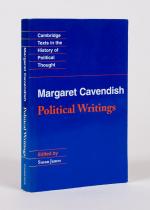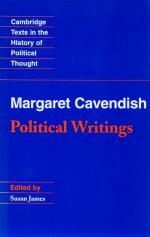Cavendish, Political Writings.
Political Writings. Series Editors Raymond Guess and Quentin Skinner.
Cambridge, Cambridge University Press, 2003. 14 cm x 21.5 cm. XXXIX, 298 pages. Original Softcover. Very good condition with only minor signs of external wear. Spine sunned. Several annotations in ink and highlighter pen throughout. Minor crease to endpaper. [Cambridge Texts in the History of Political Thought].
Includes for example the following essays: Chronology of Margaret Cavendish / The Description of a New World, Called The Blazing World / Orations of Divers Sorts, Accommodated to Divers Places etc.
Margaret Lucas Cavendish, Duchess of Newcastle-upon-Tyne (1623 – 15 December 1673) was an English philosopher, poet, scientist, fiction writer and playwright. Being related to royalists, she spent some of the English Civil War in France. She wrote in her own name in a period when most women writers remained anonymous.
Born Margaret Lucas, she was the youngest sister of the royalists Sir John Lucas and Sir Charles Lucas, who owned the manor of St John’s Abbey, Colchester. She became an attendant on Queen Henrietta Maria and travelled with her into exile in France, living for a time at the court of the young King Louis XIV. She became the second wife of William Cavendish, 1st Duke of Newcastle-upon-Tyne in 1645, when he was a marquess.
Cavendish, as a poet, philosopher, writer of prose romances, essayist and playwright, published under her own name at a time when most women writers remained anonymous. Her topics included gender, power, manners, scientific method and philosophy. Her utopian romance The Blazing World is one of the earliest examples of science fiction. She was unusual in her time for publishing extensively in natural philosophy and early modern science, producing over a dozen original works; with her revised works the total came to 21.
Cavendish has been championed and criticised as a unique, ground-breaking woman writer. She rejected the Aristotelianism and mechanical philosophy of the 17th century, preferring a vitalist model. In 1667, she became the first woman to attend a meeting at the Royal Society of London, criticising and engaging with members and philosophers Thomas Hobbes, René Descartes, and Robert Boyle. She has been claimed as an early opponent of animal testing.
Cavendish’s publications brought her fame and challenged the contemporary belief that women were inherently inferior to men. Cavendish used them to advocate women’s education: women were capable of learning and benefiting from education, and she insisted her own works would have been better still if, like her brothers, she had been able to attend school.
Eileen O’Neill provides an overview of Cavendish’s natural philosophy and its critical reception in her introduction to Observations upon Experimental Philosophy. She describes Cavendish’s natural philosophy as rejecting Aristotelianism and mechanical philosophy and favouring Stoic doctrines: while women rarely wrote about natural philosophy in the 17th century, Cavendish published six books on the subject.
Eileen O’Neill points out that Cavendish herself was not formally educated in natural philosophy, though William Cavendish and his brother Charles shared an interest in the subject and supported her interest and study in the area. She may also have been influenced by social encounters with philosophers such as Thomas Hobbes. O’Neill believes Hobbes (who had instructed Charles in philosophy) had marked influence on Cavendish’s natural philosophy, making her one of the few 17th-century supporters of Hobbes’ materialist philosophy, which argued that incorporeal souls did not exist in nature. Beginning in the 1660s, Cavendish began to study the work of her contemporaries more seriously. O’Neill suggests that such study was meant to enable Cavendish to argue her own points better by contrast with those of other natural philosophers.
O’Neill notes that Cavendish’s natural philosophy and her writing in general were criticised by many contemporaries and by more recent readers, such as Pepys, Henry More and Virginia Woolf. Cavendish’s work has also received positive criticism and been lauded by many for tackling typically male-dominated subjects such as natural philosophy. Letters and poems of praise by her husband were included in several of her published works. (Wikipedia)
- Keywords: 17th Century Literature · Catalogue Three – Literature by Women · Political and Social Views · Political Ideas · Political Philosophy · Women and Literature · Women and Philosophy · Women Philosophers
- Language: English
- ISBN: 9780521633505
- Inventory Number: 60530AB
EUR 68,--
© 2025 Inanna Rare Books Ltd. | Powered by HESCOM-Software












